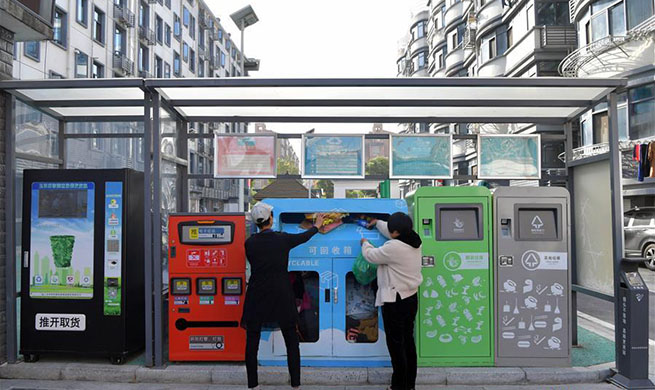DOVER, Oct. 31 (Xinhua) -- John Shirley is a freight agent and a well-known face and voice in the hub of the freight industry in East Kent. Having been in the United Kingdom (UK) freight industry for over 20 years, Shirley believes that Brexit, be it a deal or no deal, will severely impact his business.
"We have seen every sort of cargo and every sort of situation -- we have gone over virtually every difficult situation but this one, Brexit, is bigger than we can cope with," said Shirley, founder of John Shirley Ltd., an international freight forwarder situated in an old train station in the British port of Dover.
As Britain is set to embrace a general election and a once again delayed Brexit, uncertainty continues. For Shirley, Brexit is not only likely to make time estimations for import and export near-impossible, but also largely disrupt the company's business, in particular the annual charity shoebox initiative, which sends thousands of aid packages out to orphans and children in need across the continent for Christmas.
SHOEBOX CONCERNS
John Shirley Ltd. is a company that assists freight from both inside and outside the European Union (EU) to get through customs efficiently by coordinating with various border agencies and assisting with customs paperwork, as well as facilitating demurrage if there are any delays. A large part of the company's income comes from charity shoeboxes, an annual initiative that began in the mid-1990s to gift children in war-torn or deprived areas with presents and aid for Christmas.
The operation has run rather smoothly for decades, but with the Port of Dover likely to become overcrowded and the UK government predicting days of delays with a whole range of new paperwork to be submitted and verified, it is likely to have a knock-on effect on the process and timing.
"I'm so worried that we cannot get our Christmas shoeboxes out, which we're responsible for. That's two-thirds of our income down the pan, we can't afford that."
The company works with schools and charities to get the shoeboxes out of the UK on time. Each truck can carry up to 10,000 boxes to send to Lesotho, Belarus or Bosnia -- there are a range of destinations.
The concern is that the whole chain of supply of these shoeboxes could fall apart as not only delays will deter volunteers and schools from taking part but the issues with getting the goods out of the country could become too costly to keep up.
With the list of impacts on the UK import and export market set out in Operation Yellowhammer, and most notably in Dover, freight agents have become more outspoken on how much delays and a lack of preparation could hit the trade.
"Nothing will be able to move. I've been trying to explore ways of getting the shoeboxes into the EU by container. All these options I'm trying to explore, but everybody else will be doing the same thing. Who knows how far we will get with that. I mean, it's a horror story -- a trainwreck."
SHORTAGE OF CUSTOMS CLERKS
Adding to the concerns of businesses within the freight industry is how the Port of Dover will cope with the extra demand in customs checks.
Currently only one percent of the around 10,000 lorries that pass through every day have to go through customs clearance. After Brexit, it will be compulsory for every lorry to be checked.
Freight agents are concerned that there are not enough customs clerks to deal with the amount of lorries after Brexit.
Due to their administrative and clerical role in the preparation and processing of customs documents, clerks are imperative for the smooth running of the port and for freight agents like John Shirley Ltd.
"In 1992, here in East Kent, the largest employers were freight agents, we freight agents employed over 2,000 clerks," Shirley told Xinhua.
"In 2019, there are just 200 left -- most of them have retired. These 200 service trucks come from Turkey, Ukraine, Belarus, Albania or Switzerland -- or Norway."
Shirley estimates that Dover and East Kent will have to employ up to 8,000 customs clerks to match the 400 percent increase in lorries since 1992.
"The trouble is, it takes a year to teach customs clerks: train them, invest time for them just to learn the basics. It takes five years before you can leave them on their own to do their own thing. It's quite a complicated business, it's difficult and not something that you can do overnight."
According to Shirley, the UK government has made a pledge to increase the number of customs clerks in East Kent to ease the strain on businesses within the freight industry -- but he is yet to be convinced that this will be fully implemented.
"I recently saw some publication saying they'd released some money to train around 3,000 clerks. I haven't heard, on the ground, anybody doing that. I don't even know if there is the office space here in East Kent for that number of clerks."
For his business, and the wider UK import-export market, to flow freely, an agreement for an increase in clerks needs to be struck between the UK and France.
Shirley believes that the UK's decision to leave the EU without fully consulting experts within the freight industry has set the field back decades.
"What type of country goes backwards? We in the freight industry, we're going to wreck the country without lifting a finger, or rather the prime minister is going to wreck the country through us.
"If we can't get our imports in and we can't get our exports out, I think local businesses can prepare for bankruptcy," he said.













